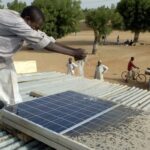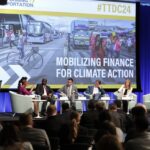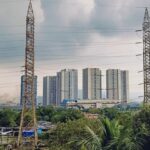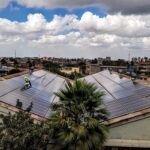Posts tagged with 'decarbonization'
Brazilians are currently living in a dystopian landscape. Thick smoke, oppressive heat and eerily orange sunsets blanket both major cities and small villages. Hundreds of cities are exposed to dangerous levels of air pollution while thousands of hectares of forest burn. ...

The built environment is not on track globally to achieve its sectoral climate targets. Accounting for over a third of total energy system emissions already, the continued use of carbon-intensive materials paired with inefficient energy use throughout the built environment ...

Climate change and social inequality are two of the most pressing challenges of our time. But, in the race to net zero, a narrow focus on decarbonization risks exacerbating inequality and results in a rising tide of “greenlash” (backlash against ...

In March 2024, the inaugural Buildings and Climate Global Forum convened more than 1,000 participants to spur action towards built environment decarbonization and resilience. The first-of-its-kind forum was welcome, as the sector needs a shakeup. The big issue on the table was ...

By early 2025, countries are due to unveil new national climate commitments under the Paris Agreement, known as nationally determined contributions (NDCs). These commitments form the foundation of international climate action, establishing emissions-reduction targets and other measures that countries promise ...

The adoption of any new technology involves some degree of adaptation, and battery electric buses (e-buses) are no exception. After decades of experience with diesel vehicles, cities and operators need to understand the technical and operational specifications of e-buses to ...

If a picture can tell a whole story, then the image below of an intersection in Dar es Salaam, Tanzania, shows the past, present and future of global transformation in the transport sector. During Transforming Transportation 2024, which focused on ...

2023 was hot but ultimately hopeful. The past year saw record-breaking temperatures and an onslaught of extreme weather events like droughts, floods and heatwaves. Cities often bore the brunt of these conditions, exacerbated by the urban heat island effect: when ...

India aims to reduce the emissions intensity of its economy by 45% by 2030, compared to 2005 levels, and to achieve net-zero emissions by 2070. The country can’t achieve either goal without a radical transformation in its buildings and construction sector, which was responsible for around 17% of the nation’s ...

In Asia, 14 countries — accounting for 26% of global transport emissions in 2019 — have made economy-wide net zero commitments. Momentum towards zero-emission transport is growing with countries enhancing ambition and including transport-related targets in their nationally determined contributions (NDCs). However, ...

In the Seychelles archipelago in east Africa, flooding and erosion caused by rising sea levels pose an imminent threat to the country’s many low-lying islands. At the same time its mangrove forests, which serve as a vital buffer against these ...

With recognition of the vital role of both subnational and national governments in the climate agenda, the G7 Roundtable on Subnational Climate Actions was established by the G7 Climate, Energy and Environment Ministers Meeting in 2023 under the presidency of Japan. The ...

By Sophie Boehm, Clea Schumer, Emma Grier, Louise Jeffery, Judit Hecke, Joel Jaeger, Claire Fyson, Kelly Levin, Anna Nilsson, Stephen Naimoli, Joe Thwaites, Katie Lebling, Richard Waite, Jason Collis, Michelle Sims, Neelam Singh, William Lamb, Sebastian Castellanos, Anderson Lee, Marie-Charlotte Geffray, Raychel Santo, Mulubrhan Balehegn, Michael Petroni and Maeve Masterson on November 20, 2023
Today’s climate change headlines often seem at odds with each other. One day, it’s catastrophic wildfires wreaking havoc around the world; the next, it’s an optimistic piece on the rapid scale-up of solar and wind power. Taken together, such stories ...

City officials tasked with reducing and eliminating greenhouse gas emissions from their communities face a tricky task in estimating building emissions as they work to prevent the most harmful impacts of climate change. The biggest challenge is that there isn’t consensus ...

Climate change is already having a significant impact on Africa’s ecosystems, economy and society. This year alone, 1.8 million Africans were displaced during a prolonged drought, the Democratic Republic of Congo experienced catastrophic flooding, and Cyclone Freddy left a trail of destruction in Malawi and Mozambique. ...





























